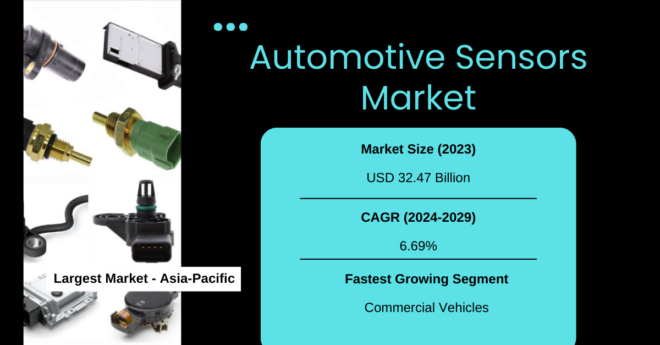
The global automotive sensors market has demonstrated substantial growth, reaching USD 32.47 billion in 2023 and is projected to grow at a CAGR of 6.69% through 2029. This growth is fueled by advancements in sensor technologies, the proliferation of electric and hybrid vehicles, and stringent government regulations promoting safety and efficiency.
Despite challenges, including cost constraints and cybersecurity risks, the market presents numerous opportunities for innovation and collaboration. This report explores the key drivers, challenges, emerging trends, regional dynamics, and future opportunities shaping the global automotive sensors market.
Introduction
Overview of Automotive Sensors
Automotive sensors are critical components that enable vehicles to monitor, interpret, and respond to their environment. These devices play a pivotal role in enhancing vehicle safety, efficiency, and performance. Their applications range from advanced driver assistance systems (ADAS) to powertrain optimization and vehicle security systems.
Automotive Sensors Market Drivers
- Advancements in Sensor Technology
Technological innovation has led to the development of highly accurate, reliable, and cost-effective sensors. These advancements support features such as ADAS and autonomous driving, significantly improving vehicle safety and functionality.
- Growth of Electric and Hybrid Vehicles
The increasing adoption of electric and hybrid vehicles (EVs and HEVs) has propelled demand for sensors crucial for battery monitoring, thermal management, and overall vehicle performance optimization.
Browse over market data Figures spread through XX Pages and an in-depth TOC on the “Global Automotive Sensors Market” @ https://www.techsciresearch.com/report/automotive-sensors-market/20137.html
- Stringent Government Regulations
Governments worldwide are enforcing safety and emissions regulations, driving automakers to integrate advanced sensor technologies to meet these requirements. Sensors are pivotal in reducing emissions and enhancing safety.
Automotive Sensors Market Challenges
High Costs and Complexity
The integration of advanced sensor systems adds complexity and cost to vehicle manufacturing, posing challenges for automakers operating in competitive and cost-sensitive markets.
Reliability and Durability Concerns
Ensuring sensors function reliably under diverse and harsh operating conditions remains a significant challenge for the industry.
Cybersecurity Threats
Connected vehicle systems face risks of cyberattacks, necessitating robust security measures to protect sensitive data and ensure operational safety.
Emerging Trends in Automotive Sensors Market
- Artificial Intelligence (AI) and Machine Learning (ML)
AI and ML are increasingly being integrated into sensor systems to enhance real-time data processing, predictive maintenance, and overall functionality.
- Vehicle Electrification
The shift towards electric vehicles drives innovation in sensors, particularly for advanced battery management and thermal regulation systems.
- Growth of Connected and Autonomous Vehicles
The adoption of LiDAR, radar, and camera-based sensors is rising to support autonomous driving and ADAS, ensuring better situational awareness and decision-making capabilities.
Opportunities
Research and Development
Investments in R&D are expected to yield innovative sensor technologies that are efficient, reliable, and cost-effective.
Collaborations and Partnerships
Joint ventures between automakers, tech companies, and research institutions can accelerate the development of sensor solutions tailored to industry needs.
Focus on Sustainability
The emphasis on reducing emissions and improving fuel efficiency offers opportunities for sensors that optimize engine performance and emissions control systems.
Applications of Automotive Sensors
- Powertrain Sensors
Powertrain sensors monitor and control engine parameters, transmission systems, and exhaust systems. These sensors, including temperature, pressure, and oxygen sensors, enhance performance, fuel efficiency, and emissions compliance.
- Body Electronics Sensors
Body electronics rely on sensors for applications such as lighting systems, climate control, and infotainment. These sensors improve passenger comfort and safety, with demand particularly strong in luxury and advanced vehicles.
- Vehicle Security Sensors
Sensors like motion detectors and tilt sensors are integral to alarm systems and immobilizers, addressing rising concerns about vehicle theft and unauthorized access.
- Telematics Sensors
Telematics systems use sensors for GPS navigation, remote diagnostics, and vehicle-to-everything (V2X) communication. These systems are essential for connected and autonomous vehicles.
Automotive Sensors Market Regional Analysis
North America
North America remains a key market, driven by technological advancements, stringent regulatory standards, and significant investments in connected and autonomous vehicles.
Europe
Europe’s focus on innovation and sustainability supports robust growth. The region’s strong automotive sector emphasizes the adoption of advanced sensor technologies.
Asia-Pacific
Asia-Pacific is a rapidly growing market, fueled by industrialization, a booming automotive sector, and investments in vehicle electrification and smart transportation.
South America and Middle East & Africa
These regions are witnessing steady growth due to improving economic conditions and increasing automotive production, though they currently represent smaller market shares.
Key Developments in Automotive Sensors Market
OmniVision’s Automotive Image Sensors
In 2024, OmniVision introduced advanced automotive image sensors at CES 2024, featuring enhanced resolution and low-light performance. These sensors align with the evolving needs of the automotive industry, supporting safety and autonomous driving applications.
Download Free Sample Report @ https://www.techsciresearch.com/sample-report.aspx?cid=20137
Customers can also request 10% free customization on this report.
Automotive Sensors Market Competitive Landscape
Major Players
Key companies operating in the global automotive sensors market include:
-
DENSO Corporation
-
Infineon Technologies AG
-
Robert Bosch GmbH
-
Texas Instruments Inc.
-
Sensata Technologies, Inc.
-
Phinia Inc.
-
CTS Corporation
-
NXP Semiconductors NV
-
Analog Devices Inc.
These players are focusing on innovation, strategic partnerships, and expanding their product portfolios to maintain competitiveness.
Conclusion and Outlook
The global automotive sensors market is poised for sustained growth, driven by advancements in technology, increasing vehicle electrification, and the adoption of connected and autonomous driving systems.
While challenges such as cost constraints and cybersecurity risks persist, the market’s future is bright, with opportunities for innovation and collaboration across the industry.
As automakers and technology providers continue to innovate, automotive sensors will remain at the forefront of shaping the future of mobility, and driving progress in vehicle safety, performance, and connectivity.
You may also read:
Automotive Interior Leather Market Trends and Forecast [CAGR: 5.59%] through 2029
LED Fog Lamp Market to Witness Significant Growth: [7.59% CAGR] and USD 2.81 Billion by 2029
Bike Sharing Market: Future Outlook, Key Players, Trends, and USD 4.32 Billion Valuation by 2029 (CAGR: 5.83%)
Automotive Lithium-Ion Battery Market Report: USD 45.27B and 7.05% CAGR by 2029
